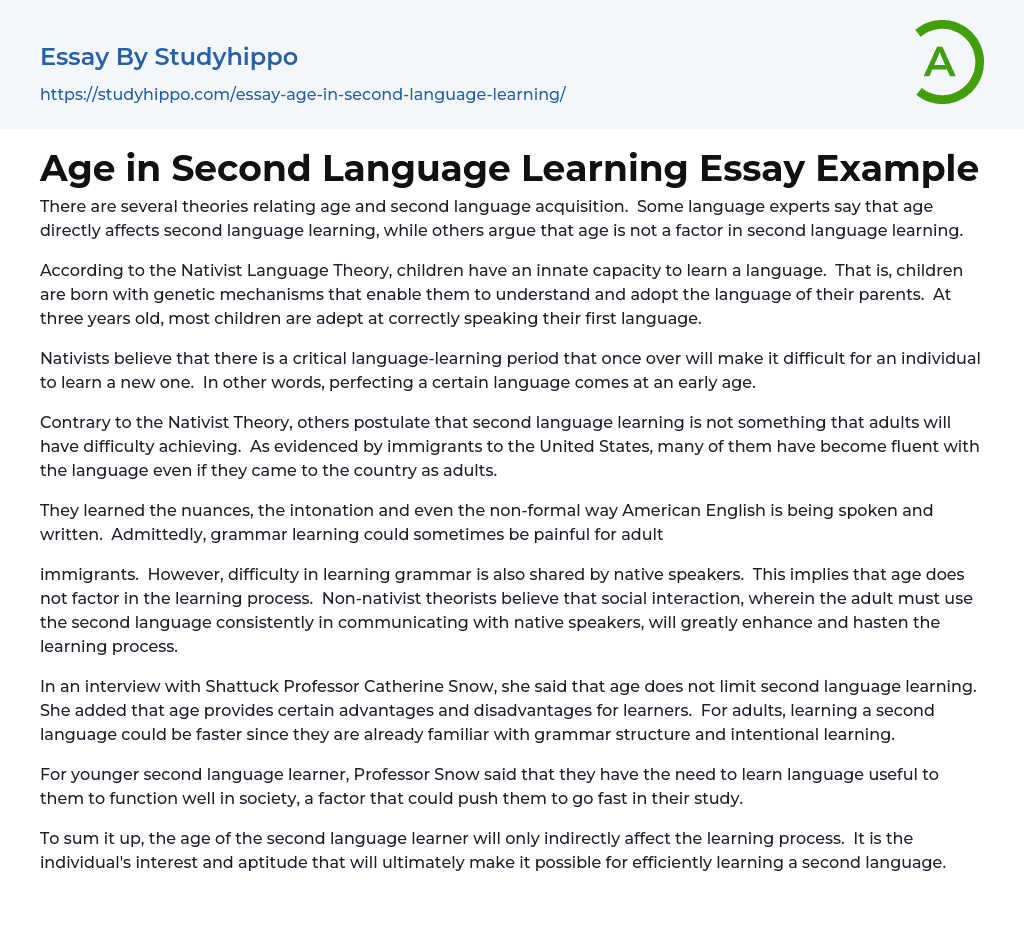There are several theories relating age and second language acquisition. Some language experts say that age directly affects second language learning, while others argue that age is not a factor in second language learning.
According to the Nativist Language Theory, children have an innate capacity to learn a language. That is, children are born with genetic mechanisms that enable them to understand and adopt the language of their parents. At three years old, most children are adept at correctly speaking their first language.
Nativists believe that there is a critical language-learning period that once over will make it difficult for an individual to learn a new one. In other words, perfecting a certain language comes at an early age.
Contrary to the Nativist Theory, others postulate that second langu
...age learning is not something that adults will have difficulty achieving. As evidenced by immigrants to the United States, many of them have become fluent with the language even if they came to the country as adults.
They learned the nuances, the intonation and even the non-formal way American English is being spoken and written. Admittedly, grammar learning could sometimes be painful for adult
immigrants. However, difficulty in learning grammar is also shared by native speakers. This implies that age does not factor in the learning process. Non-nativist theorists believe that social interaction, wherein the adult must use the second language consistently in communicating with native speakers, will greatly enhance and hasten the learning process.
In an interview with Shattuck Professor Catherine Snow, she said that age does not limit second language learning. She added that ag
provides certain advantages and disadvantages for learners. For adults, learning a second language could be faster since they are already familiar with grammar structure and intentional learning.
For younger second language learner, Professor Snow said that they have the need to learn language useful to them to function well in society, a factor that could push them to go fast in their study.
To sum it up, the age of the second language learner will only indirectly affect the learning process. It is the individual's interest and aptitude that will ultimately make it possible for efficiently learning a second language.
- Academia essays
- Higher Education essays
- Language Learning essays
- Studying Business essays
- Education System essays
- Study essays
- First Day of School essays
- Scholarship essays
- Pedagogy essays
- Curriculum essays
- Coursework essays
- Studying Abroad essays
- Philosophy of Education essays
- Purpose of Education essays
- Brainstorming essays
- Educational Goals essays
- Importance Of College Education essays
- Brown V Board of Education essays
- The Importance Of Higher Education essays
- Online Education Vs Traditional Education essays
- Academic And Career Goals essays
- Academic Integrity essays
- Brown Vs Board Of Education essays
- Distance learning essays
- Technology in Education essays
- Vocabulary essays
- Writing Experience essays
- Importance of Education essays
- Early Childhood Education essays
- Academic Degree essays
- Academic Dishonesty essays
- School Uniform essays
- Academic writing essays
- Cheating essays
- Bachelor's Degree essays
- MBA essays
- College Life essays
- Grade essays
- Diploma essays
- Phonology essays
- Sentence essays
- Filipino Language essays
- Pragmatics essays
- Millennium Development Goals essays
- History Of Education essays
- Graduate School essays
- Middle School essays
- School essays
- Special Education essays
- University essays




